Dogs
Why Does My Dog Have Diarrhea? Understanding the Causes
Ongoing diarrhea in dogs can be caused by a variety of factors, from dietary changes to underlying infections, making it crucial to explore the root cause.

If our dog has diarrhea, it may be caused by different factors. Changes in diet, consuming disagreeable substances, and even food allergies can lead to loose stools, vomiting, and other symptoms. Infections such as parvovirus, parasites, or intestinal disorders could also be to blame.
If the issues persist, seeking veterinary help is essential to identify the exact cause and provide appropriate treatment. Understanding these causes is vital for our dog's health and comfort.
Key Takeaways
- Dietary changes, infections, parasites, and intestinal disorders are common causes of dog diarrhea.
- Food allergies, spoiled food, and abrupt diet changes can trigger diarrhea in dogs.
- Infections like parvovirus and parasites like Giardia can lead to diarrhea in dogs.
- Stress and changes in routine can disrupt hormone balance and cause diarrhea in dogs.
- Veterinary assistance is crucial for accurate diagnosis and treatment of dog diarrhea.
Common Causes of Dog Diarrhea
Vital causes of dog diarrhea often stem from dietary changes or the ingestion of disagreeable substances. When our furry friends experience diarrhea, it can be a worrisome and uncomfortable ordeal for both them and us. The symptoms are usually quite apparent – frequent loose or watery stools, straining to defecate, vomiting, lethargy, and sometimes blood in the stool. It's imperative to understand that diarrhea in dogs can be caused by a variety of factors, ranging from mild issues like dietary indiscretions to more severe conditions like infections or underlying health problems.
While some cases of diarrhea may resolve on their own, it's important to monitor your dog closely and seek veterinary help if the symptoms persist for more than a day or two, or if they're accompanied by other concerning signs. Your vet may recommend medications, dietary changes, or further diagnostic tests to determine the exact cause of your dog's diarrhea and provide appropriate treatment. Remember, prompt attention and care can help alleviate your dog's discomfort and safeguard their health and well-being.
Dietary Indiscretions and Allergies
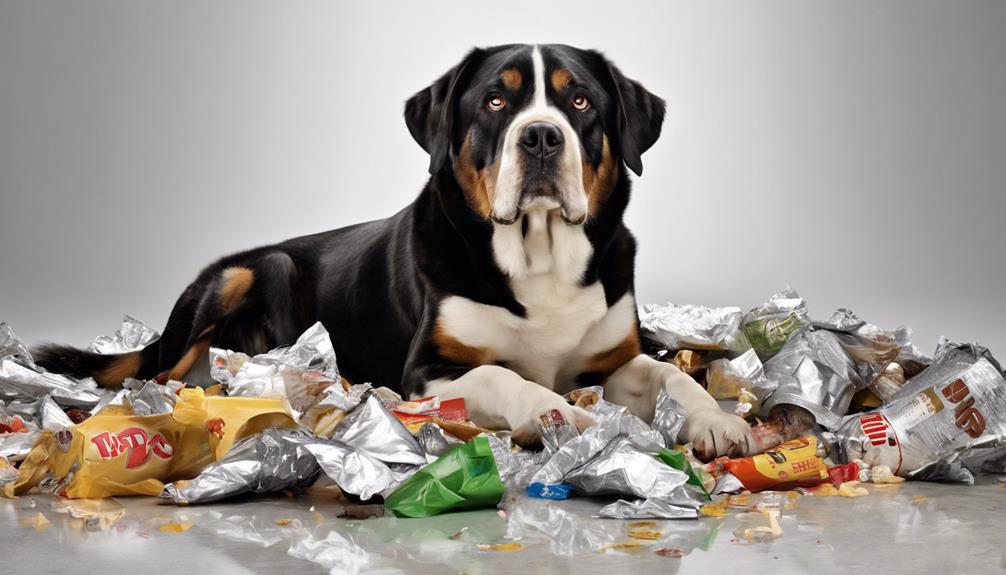
When dogs consume inappropriate or allergenic substances, it can lead to gastrointestinal disturbances such as diarrhea. Here are some key points to keep in mind when understanding dietary triggers for diarrhea in dogs:
- Food Allergies: Dogs can develop diarrhea as a result of food allergies, where certain ingredients provoke an immune response leading to gastrointestinal upset.
- Spoiled Food: Consumption of spoiled or contaminated food can cause diarrhea in dogs due to bacterial overgrowth or toxins present in the food.
- Abrupt Diet Changes: Suddenly altering your dog's diet, whether by shifting to a new brand of food or introducing new ingredients, can disrupt their digestive system and result in loose stools.
- Toxic Foods: Foods like chocolate, onions, garlic, and grapes are poisonous to dogs and can cause digestive issues, including diarrhea.
Identifying and managing specific dietary triggers, avoiding toxic foods, and gradually shifting to new diets can help prevent and alleviate diarrhea in dogs.
Infections and Parasites
Infections and parasites pose significant risks to dogs, potentially leading to gastrointestinal disturbances such as diarrhea. Common culprits include parvovirus, distemper, and bacterial infections, all of which can trigger diarrhea in our furry companions. Additionally, parasites like Giardia, hookworms, and roundworms are known to cause gastrointestinal issues and diarrhea in dogs.
When infections or parasites are the root cause of diarrhea, dogs may experience severe symptoms such as dehydration. It's important to adhere to regular deworming and vaccination schedules to help prevent these infections and parasitic infestations that can lead to diarrhea. Seeking veterinary assistance is essential for accurate diagnosis and treatment.
Veterinary testing is often required to pinpoint the specific infection or parasite causing the diarrhea, enabling targeted treatment and a quicker recovery for our beloved pets. Remember, early detection and intervention are key to ensuring our dogs' health and well-being when facing infections or parasites.
Intestinal Disorders and Diseases
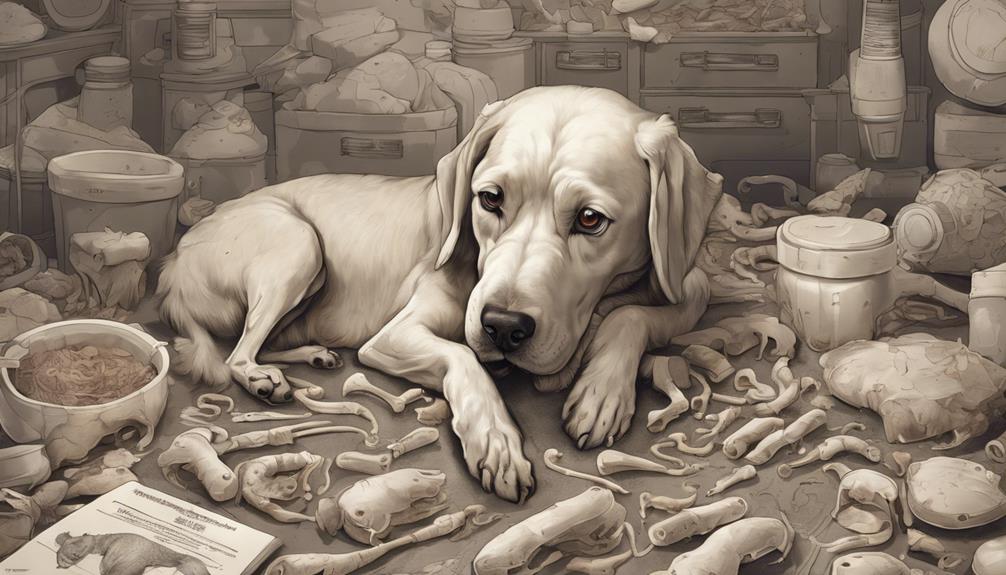
What symptoms can indicate the presence of intestinal disorders and diseases in dogs? Here are some key indicators to watch for:
- Inflammatory Bowel Disease (IBD): Dogs with IBD may experience chronic diarrhea, often accompanied by weight loss and vomiting.
- Intestinal Parasites: Infestations of parasites like giardia or worms can lead to diarrhea, which may contain blood or mucus.
- Pancreatitis and Colitis: Conditions such as pancreatitis and colitis can cause gastrointestinal upset, resulting in diarrhea with varying degrees of severity.
- Bacterial Gastroenteritis: Infections from bacteria can trigger acute diarrhea in dogs, often with additional symptoms like fever and lethargy.
Each of these factors can contribute to gastrointestinal issues in dogs. Monitoring your dog's bowel movements and overall health closely is crucial, as chronic diarrhea or persistent gastrointestinal upset could signal an underlying problem that requires veterinary attention.
Additionally, conditions like kidney or liver issues can also manifest as diarrhea, underscoring the importance of timely diagnosis and treatment.
Stress and Other Factors
Moving from the discussion on intestinal disorders and diseases in dogs, stress and other factors play a significant role in triggering diarrhea in canine companions. Stress can disrupt the delicate balance of hormones in a dog's body, affecting the gastrointestinal system and leading to diarrhea. Changes in routine, environment, or social interactions can all contribute to stress-induced diarrhea in dogs.
Anxiety, fear, and separation from their owners or familiar environments can also play a part in causing digestive upset and diarrhea in dogs. Fortunately, stress-related diarrhea can be managed through various techniques such as behavior modification, environmental enrichment, and implementing calming strategies.
Frequently Asked Questions
Do Dogs Sometimes Get Diarrhea for No Reason?
Yes, dogs can sometimes get diarrhea for no obvious reason. Factors like stress, dietary changes, or minor lapses can trigger this problem. Typically, these episodes resolve on their own.
Monitoring your dog's condition is vital. If the diarrhea continues or is accompanied by concerning symptoms, seeking advice from a veterinarian is recommended. It's important to safeguard your dog's well-being and address any health concerns promptly.
What to Do if Your Dog Has Diarrhea but Is Acting Normal?
If your dog has diarrhea but is acting normal, it could indicate a minor tummy problem. Keep an eye out for other symptoms like vomiting or weakness. Ensure your furry friend stays hydrated and try a bland diet.
If the situation continues or worsens, it's wise to seek advice from a vet for proper care. Remember, our pups' well-being is a top priority, so prompt attention to their health is essential.
At What Point Should I Be Worried About My Dog Having Diarrhea?
If our dog experiences diarrhea, we should be concerned if it persists or worsens over a day, especially if accompanied by signs like blood in the stool, weakness, or dehydration.
Straining to pass watery stool might suggest a potential blockage needing urgent attention.
Monitoring for these symptoms and seeking prompt veterinary care can aid in managing any underlying health issues effectively.
What if My Dog Has Diarrhea but Still Eating and Drinking?
If our dog has diarrhea but is still eating and drinking, it could be due to mild gastrointestinal upset from dietary indiscretion or stress. Though appetite and hydration are important signs, underlying issues like infections or parasites could be present.
Monitoring for additional symptoms like vomiting, weakness, or blood in stool is essential. Providing a bland diet and ensuring access to fresh water can help.
Consulting a veterinarian is recommended to rule out serious causes and determine the best course of action.
Can Toxic Foods for Dogs Cause Diarrhea?
Yes, toxic foods for dogs can cause diarrhea. Certain foods like chocolate, grapes, and onions are toxic to dogs and can lead to gastrointestinal issues such as diarrhea. It’s important for pet owners to be aware of what foods are harmful and to keep them out of reach of their furry friends.
Conclusion
So, next time your furry friend is experiencing some explosive bowel movements, remember that there could be a multitude of reasons behind it. From dietary indiscretions to stress, the causes of dog diarrhea are vast and varied.
It's a real crapshoot trying to figure out what's causing all the mess, but with a little detective work and maybe a trip to the vet, you'll hopefully get to the bottom of it.
As our Editor-in-Chief, James plays a pivotal role in ensuring the quality and integrity of our content. With a keen eye for detail and a passion for storytelling, James oversees the editorial process here at A Place for Animals. With years of experience in content editing, James ensures that every piece of content meets our high standards of accuracy and clarity. Under James’ guidance, you can rest assured that the content you read is informative and impeccably crafted.
Dogs
The Origins of Ebons Name
Nurture your curiosity about the enigmatic origins and powerful connotations of the name 'Ebon.

The name 'Ebon' originates in Old English, tied to ebony wood in the 15th century. It transformed to represent intense blackness by the 1590s. Latin influences give it power, elegance, and mystery, creating a name of grandeur and timelessness. In various cultures, 'Ebon' signifies strength, mystery, elegance, power, and authority. Variants like Ebony and Ebenezer hold biblical meaning. The name also connotes resilience, intelligence, history, and tradition, appealing universally with enduring qualities. The historical significance of 'Ebon' includes references to ebony wood and intense blackness, symbolizing resilience, determination, and mystery. More insights await on this fascinating name's journey.
Key Takeaways
- 'Ebon' originated from Old English in early 15th century.
- Initially tied to the adjective form of ebony.
- Evolved to symbolize intense blackness by 1590s.
- Latin and Greek roots imbue 'Ebon' with power and elegance.
- Historical reference to skin color of Africans by 1813.
The Old English Origins of 'Ebon'
The term 'Ebon' reveals its roots in Old English, tracing back to the early 15th century. Originally associated with the adjective form of ebony, a dark and hard wood highly valued for its various uses, 'Ebon' has evolved to symbolize intense blackness, a concept noted as early as the 1590s.
In the context of last names, 'Ebon' has historical ties to the color black, reflecting the rich tapestry of its linguistic journey. The adoption of 'Ebon' as a last name signifies a connection to heritage and a nod to the deep and profound shades of black that have inspired awe and admiration for centuries.
As we explore the origins of 'Ebon,' we expose a narrative that intertwines linguistic evolution with cultural connotations, offering a glimpse into the intricate web of meanings encapsulated by this ancient term.
The Latin Influence on 'Ebon'
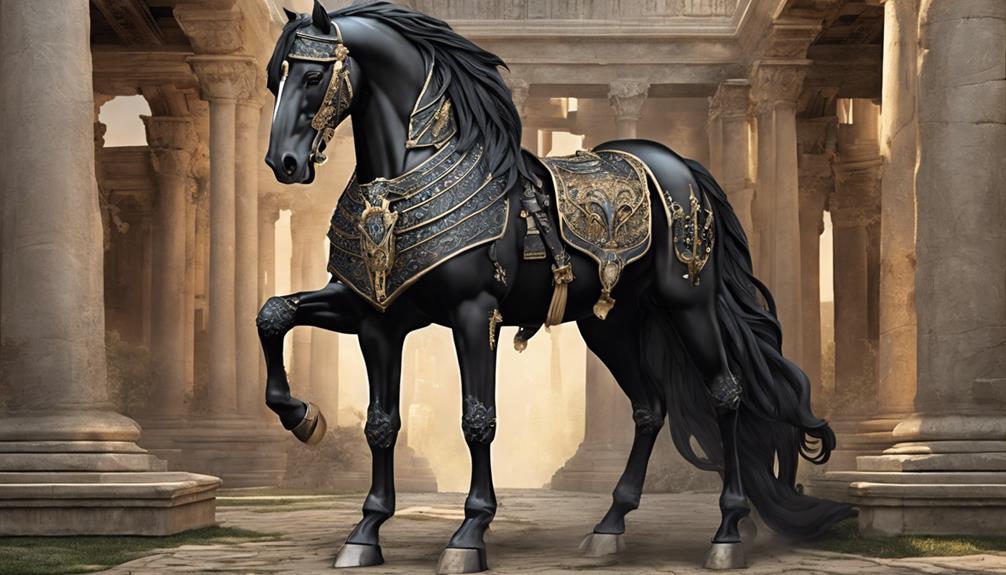
With its roots deeply intertwined in Latin and Greek languages, 'Ebon' exudes a timeless allure that echoes notions of strength, elegance, and mystery. The Latin influence on 'Ebon' is profound, reflecting its association with power and authority. The name's Latin origins highlight its classic appeal and deep historical significance, adding a layer of sophistication to its meaning. Below is a table showcasing the Latin influence on 'Ebon':
| Latin Influence | Meaning | Symbolism |
|---|---|---|
| Potestas | Power | Authority |
| Elegans | Elegance | Sophistication |
| Mysterium | Mystery | Intrigue |
| Fortitudo | Strength | Resilience |
| Auctoritas | Authority | Leadership |
The Latin roots of 'Ebon' infuse the name with a sense of grandeur and timelessness, making it a compelling choice rich in cultural significance.
The Meaning of 'Ebon' in Different Cultures
Exploring the significance of 'Ebon' across various cultures reveals its multifaceted meanings and associations beyond its Latin roots. In Latin and Greek cultures, the name 'Ebon' carries the powerful connotations of 'black' or 'dark,' symbolizing strength and mystery. This name is deeply intertwined with resilience and intelligence, embodying a profound connection to history and tradition.
Across different cultures, 'Ebon' is synonymous with elegance, power, and authority, drawing from its ancient Roman and Greek origins. Its timeless and classic appeal speaks to sophistication and depth, making it a name of enduring quality. Variants such as Ebony, Eben, and Ebenezer also bear historical and biblical significance, offering unique twists on the name 'Ebon.'
These names hold a rich tapestry of meanings that transcend borders, showcasing the universal allure of 'Ebon' and its variations in the world of names.
Historical Significance of the Name 'Ebon'
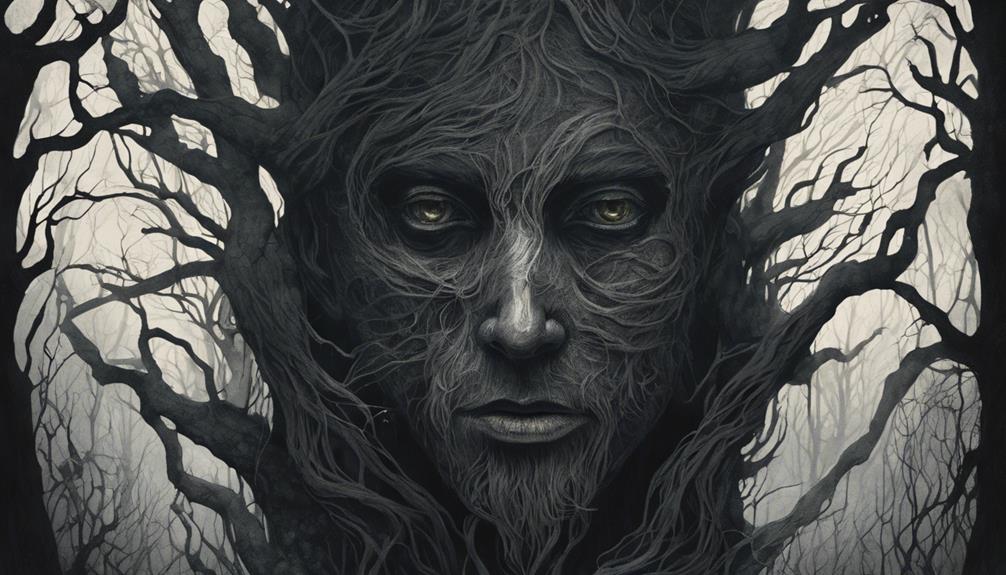
Delving into the historical significance of the name 'Ebon' uncovers a rich tapestry of connections to materials, cultures, and symbolism.
- Baby Name Associations:
The name 'Ebon' originated in the early 15th century and is linked to ebony, a dark, hard wood favored for various uses. Its figurative use for intense blackness dates back to the 1620s, with an adjective form emerging in the 1590s.
- Material Connotations:
The term 'Ebonite,' coined in 1860, combines 'ebon' and '-ite' to signify a related material or substance, emphasizing its historical ties to strength and durability.
- Cultural References:
By 1813, 'Ebon' had a historical reference to the skin color of Africans, reflecting its association with darkness and intensity while also symbolizing elegance and mystery rooted in ancient Roman and Greek cultures.
- Symbolism of Resilience:
The name 'Ebon' signifies resilience and determination, echoing themes of strength and mystery in various historical contexts, making it a meaningful choice for parents seeking a name with depth and significance.
Evolution of the 'Ebon' Surname
The surname 'Ebon' underwent a transformation over the centuries, reflecting its deep-rooted connection to the symbolism of dark, hard wood. Originating in the early 15th century, 'Ebon' derived from the word 'ebony,' signifying the characteristics of this material. By the 1620s, it had evolved to convey intense blackness, capturing the essence of ebony. The term 'Ebonite,' introduced in 1860, further expanded on this association, referring to a related material or substance akin to ebony.
Through the years, 'Ebon' became intertwined with concepts of skin color and holds a historical tie to African heritage. This evolution mirrors the shifting societal perceptions and associations with darkness and blackness. The popularity of names often reflects these underlying cultural currents, showcasing how 'Ebon' has adapted and resonated with different generations.
Frequently Asked Questions
What Is the Meaning of Ebons?
Ebons means 'black' or 'dark', embodying strength, elegance, and mystery. It reflects resilience and determination from ancient Roman and Greek roots. Intelligence, intuition, and a timeless appeal are qualities associated with it.
What Does Ebon Name Mean?
We love the name Ebon. It means 'black' or 'dark', representing strength, elegance, and mystery. A timeless choice that exudes power and authority. Ebon's rarity and modern edge make it a unique and compelling name.
What Is the Origin of the Word Ebon?
We found the word "ebon" originates from Latin and Greek roots, symbolizing strength, elegance, mystery, power, and authority. It evolved to describe intense blackness. The term was used for various items and associated with African skin color.
What Does "Ebon" Mean in Greek?
In Greek, 'Ebon' means 'dark' or 'black,' embodying qualities of strength, elegance, and mystery. Its association with intensity and depth adds a timeless appeal. The name symbolizes power, authority, and sophistication.
Conclusion
To sum up, the origins of the name 'Ebon' are as mysterious and complex as the darkness it represents. From Old English roots to Latin influences, the name has evolved over time to carry different meanings in various cultures.
Its historical significance and evolution as a surname add layers to its intriguing story. So next time you come across someone named Ebon, remember the rich history behind this enigmatic name. It's more than just a label, it's a window into the past.
As our Editor-in-Chief, James plays a pivotal role in ensuring the quality and integrity of our content. With a keen eye for detail and a passion for storytelling, James oversees the editorial process here at A Place for Animals. With years of experience in content editing, James ensures that every piece of content meets our high standards of accuracy and clarity. Under James’ guidance, you can rest assured that the content you read is informative and impeccably crafted.
Dogs
7 Angry Cat Names That Exude Fierceness
Tap into your cat's wild side with these fierce names that scream power and strength – find out which one will suit your feline warrior best!
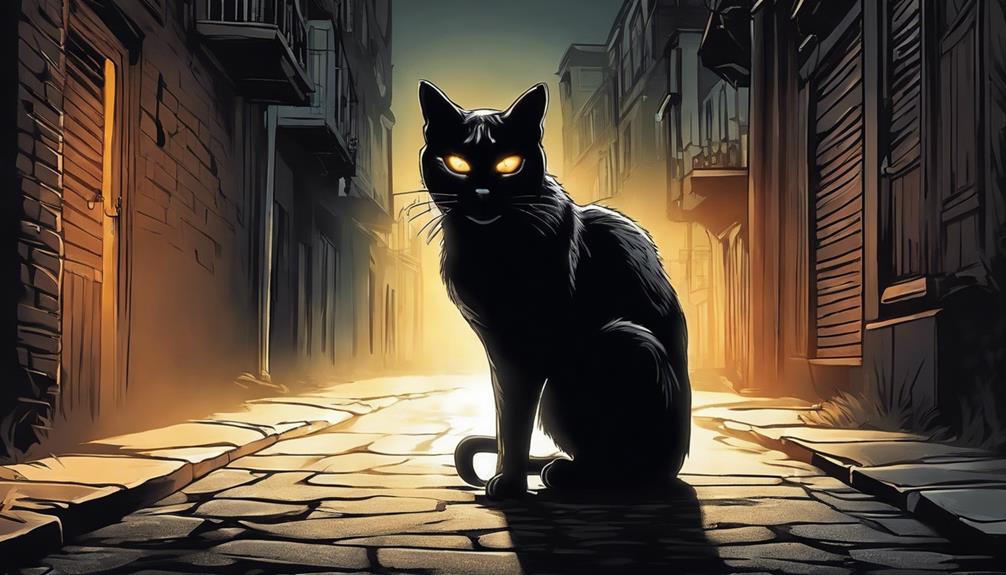
When selecting a name for your fierce feline, opt for lion-inspired monikers like Leo, Roar, or King for regal power. Warrior-themed names such as Ninja, Gladiator, and Samurai bring out strength and prowess. Mythical options like Gandalf or Legolas add a touch of mystique. Nature-inspired picks like Thunder or Avalanche evoke raw force. Villainous choices such as Maleficent or Loki exude a dark charm. Explore these fierce and strong cat names to find the perfect fit for your fiery feline. Further reveal your cat's ferocity with these intriguing name options.
Key Takeaways
- Opt for names like Shadow, Vortex, or Venom for a fierce vibe.
- Choose names such as Diablo, Banshee, or Nemesis for a dark and powerful aura.
- Consider names like Havoc, Chaos, or Fury to showcase intense energy.
- Select names such as Ghost, Wraith, or Phantom for a mysterious and menacing feel.
- Pick names like Eclipse, Inferno, or Ravage for a strong and aggressive presence.
Lion-Inspired Cat Names
When selecting names for feline companions, considering lion-inspired monikers can accentuate their regal and commanding presence. Badass cat names like Leo, Roar, and Mane evoke the strength and dominance associated with lions. These names can bring out the fierce and fearless nature of your cat, adding a touch of royalty and dominance to their personality.
Names such as King and Pride can symbolize leadership and confidence in your feline friend. Embracing these lion-inspired monikers not only showcases your cat's majestic aura but also highlights their inner power and independence.
Warrior-Themed Cat Names
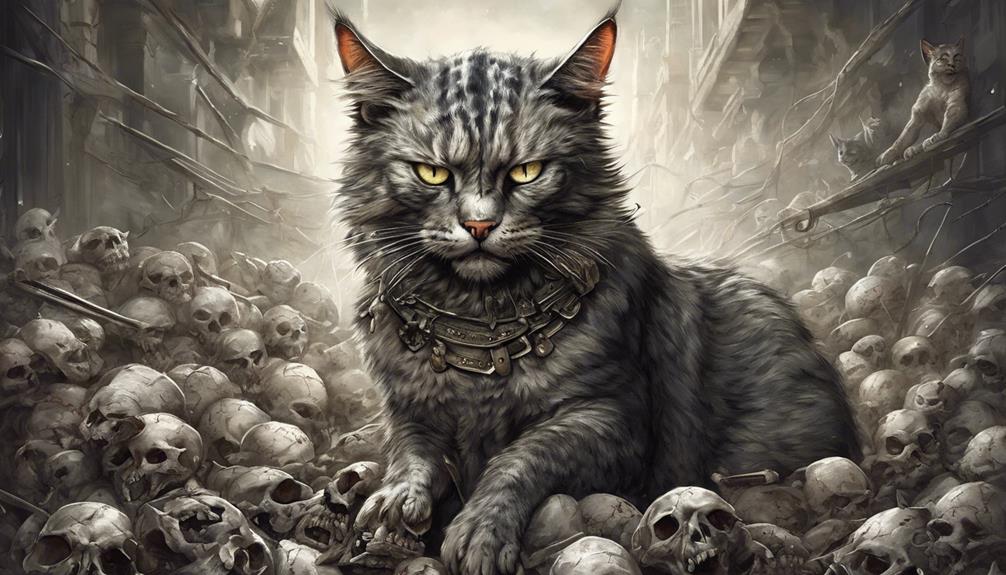
When selecting a name for your female cat that mirrors her bold and brave personality, consider options like Valkyrie, Ninja, Gladiator, Samurai, or Warrior. These names not only convey a feeling of power and valor but also capture your cat's fearless demeanor and adventurous spirit.
Opt for a name that resonates with your cat's unique characteristics and showcases her inner warrior. Female cats with warrior-themed names are often viewed as independent, daring, and full of determination.
Mythical Cat Names
Mythical cat names bring an air of mystique and power to your feline companion's persona, adding a touch of enchantment to their identity. When considering names inspired by legends and mythology, one popular source of inspiration is the epic fantasy world of Lord of the Rings. Names like Gandalf, Arwen, Legolas, or even Smaug can bestow upon your cat a sense of grandeur and otherworldly charm.
Drawing from the rich tapestry of mythical creatures and characters in Lord of the Rings, you can choose a name that reflects qualities such as strength, beauty, or wisdom. Whether your cat embodies the grace of an elf or the cunning of a dragon, these names offer a unique opportunity to celebrate your cat's majestic and mysterious nature.
Nature-Inspired Cat Names

Let's explore nature-inspired cat names that capture the essence of the wild and fierce. Nature-inspired names such as Thunder, Blaze, Avalanche, Tempest, and Tsunami can make great choices for your fierce feline companion. These names draw inspiration from powerful forces of nature, reflecting a cat's untamed and strong nature.
Cats bearing these names often exude a sense of strength and fierceness, embodying the characteristics of natural phenomena. Opting for a nature-inspired name can add a unique and impactful touch to your cat's persona and demeanor. Popular choices for fierce cats include Wildfire, Chaos, Beast, Fury, and Havoc.
Each of these names carries a sense of power and intensity, perfect for a cat with a fiery spirit. When selecting a nature-inspired name for your cat, consider the traits and qualities that resonate with you and your cat's personality, ultimately creating a name that truly embodies their wild and fierce nature.
Villainous Cat Names
Villainous cat names are perfect for felines with a dark and mysterious aura. These monikers draw inspiration from famous villains in popular culture, adding intrigue and power to your cat's persona.
Whether your cat is a sweetie with a dark side or a true troublemaker, a villainous name can make them stand out and showcase their unique personality.
Sinister Cat Monikers
What makes sinister cat monikers like Maleficent, Loki, Ursula, Jafar, and Cruella so intriguing and mysterious? Choosing a villainous name for your cat can be the perfect way to showcase their fierce and formidable side.
These names, inspired by infamous fictional villains, add a touch of darkness and intrigue to your feline friend's persona. Opting for a sinister cat moniker can reflect your cat's mischievous or cunning nature, giving them an air of power and mystique.
Names like Maleficent or Loki are perfect for cats with rebellious or enigmatic personalities, adding a sense of mystery and danger. Embracing a villainous cat name can be a fun and creative way to highlight your cat's darker, more mysterious side.
Wicked Feline Titles
Exploring the realm of sinister feline designations reveals a fascinating array of malevolent cat names that exude a sense of darkness and allure. Names inspired by notorious villains like Maleficent, Loki, Ursula, Jafar, and Cruella add a touch of mystery and mischief to your cat's persona.
These wicked feline titles draw from movies, fairy tales, and myths, infusing your cat with a rebellious and cunning nature. Ideal for cats with a mischievous aura, these names bring drama and intrigue to their character.
Embracing a villainous cat name from a TV show can be a fun way to highlight your cat's fierce and independent spirit, giving them a unique and edgy identity in the feline world.
Dark and Mysterious Cat Names
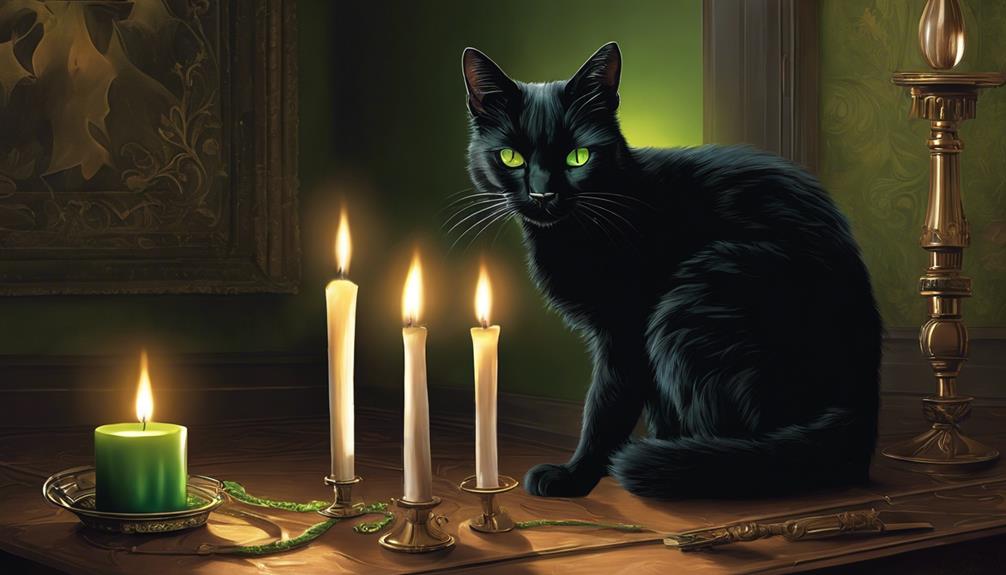
When searching for a fitting name that embodies an air of mystery and allure for your feline companion, consider dark and mysterious cat names like Shadow, Phantom, and Midnight. These names evoke a sense of intrigue and mystique that can perfectly match a cat with a mysterious or enigmatic personality. By choosing a dark and mysterious name, you can add a touch of sophistication and allure to your cat's persona, reflecting its unique and enigmatic nature.
| Dark and Mysterious Cat Names | |
|---|---|
| Shadow | Phantom |
| Midnight | Mystique |
| Raven | Eclipse |
| Noir | Luna |
| Salem | Twilight |
These names not only sound intriguing but also carry a certain depth that can make your cat stand out. So, if you're looking to give your feline friend a name that exudes a sense of mystery and allure, consider these dark and mysterious options.
Fierce and Strong Cat Names
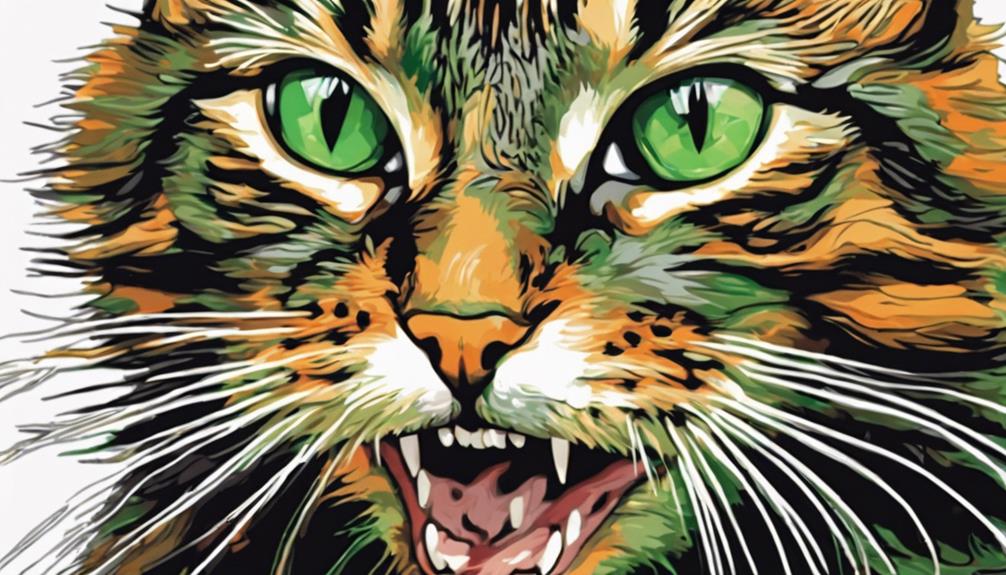
Exemplifying power and resilience, fierce and strong cat names serve as ideal monikers for felines with commanding personalities. These names, such as Thor, Athena, Hercules, Valkyrie, and Titan, exude strength and fearlessness, drawing inspiration from mythology, warriors, and powerful figures. When choosing a fierce and strong name for your cat, you not only showcase their inner strength but also highlight their fiery spirit.
These names are perfect for cats who command attention and possess a bold demeanor, reflecting a sense of power and resilience. By giving your cat a name that embodies strength and fierceness, you're acknowledging their unique personality and emphasizing their fearless nature.
Whether your cat struts around the house like a mighty warrior or exudes a quiet strength, a fierce and strong name can be a fitting tribute to their commanding presence. So, consider these powerful monikers when looking for a name that truly captures your cat's indomitable spirit.
Frequently Asked Questions
What Are Some Badass Names for Cats?
We've got some fierce cat names loaded with attitude and strength. Think legendary figures like Cleopatra, Spartacus, and Capone for a badass touch. These names pack a punch for cats with serious personality!
What Was Angry Cats Name?
We loved Grumpy Cat, also known as Tardar Sauce, an internet sensation due to her perpetually grumpy face. Despite her angry look, she brought joy worldwide. Her feline dwarfism and underbite made her unique.
What Cat Names Mean Strong?
We love names like Leo, Valkyrie, and Titan for strong cats. These names evoke power and resilience, perfect for our fierce feline friends. They inspire confidence and reflect our cats' determined and bold personalities.
What Are Some Fighter Cat Names?
We love fighter cat names for their bold and powerful vibes. Names like Warrior, Valkyrie, Ninja, Gladiator, and Samurai. They reflect bravery, courage, and tenacity. These names add an extra layer of badassery to our feline friends.
Conclusion
To sum up, choosing a fierce and angry cat name can be a fun way to showcase your pet's personality. Whether you opt for a lion-inspired name like 'Simba' or a villainous name like 'Maleficent,' the options are endless.
For example, my friend named her feisty feline 'Thor' after the mighty Norse god of thunder, and it suits his fiery temperament perfectly. Remember to choose a name that not only reflects your cat's fierceness but also brings a smile to your face every time you say it.
As our Editor-in-Chief, James plays a pivotal role in ensuring the quality and integrity of our content. With a keen eye for detail and a passion for storytelling, James oversees the editorial process here at A Place for Animals. With years of experience in content editing, James ensures that every piece of content meets our high standards of accuracy and clarity. Under James’ guidance, you can rest assured that the content you read is informative and impeccably crafted.
Dogs
Is Dieffenbachia Toxic to Dogs?
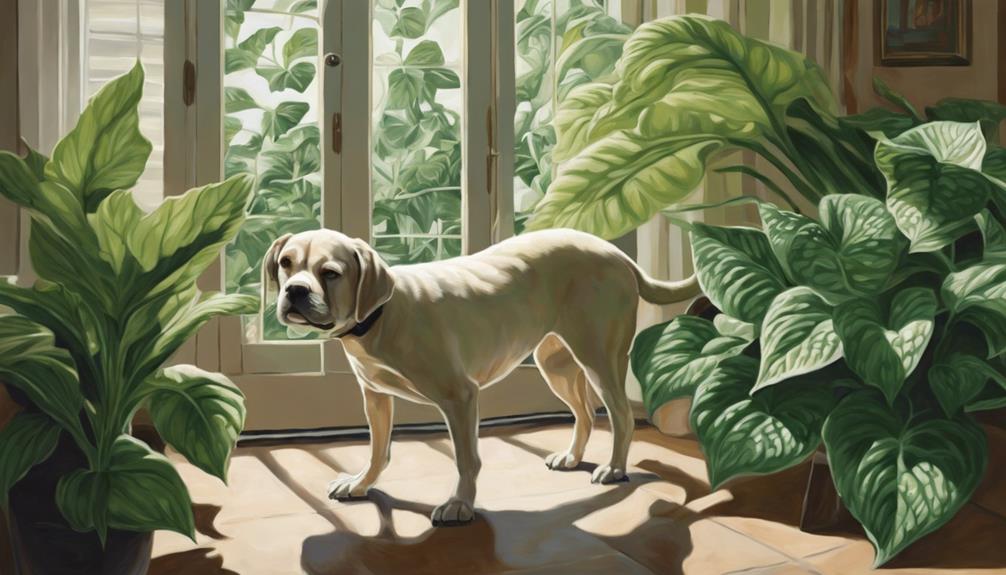
Dieffenbachia is toxic to dogs because it has calcium oxalate crystals, causing severe mouth irritation and painful sores. Symptoms include drooling, vomiting, and difficulty swallowing. Immediate vet help is necessary. Treatment may involve flushing the mouth and providing pain relief. To avoid exposure, keep plants out of reach and train dogs not to chew on them. Deterrent sprays can help. Be cautious on walks to prevent outdoor ingestion. Educate yourself and others about Dieffenbachia's danger to pets for their safety. Learn more about symptoms, diagnosis, treatment, and prevention measures.
Key Takeaways
- Dieffenbachia is toxic to dogs due to insoluble calcium oxalate crystals.
- Ingestion causes severe oral irritation, leading to painful ulcerations.
- Symptoms include drooling, vomiting, and difficulty swallowing.
- Immediate veterinary attention is crucial if ingestion occurs.
- Prevent exposure by keeping plants out of reach and educating on toxicity.
Potential Dangers of Dieffenbachia for Dogs
We must be aware of the potential dangers Dieffenbachia poses to dogs due to the presence of insoluble calcium oxalate crystals that can cause severe oral irritation. These crystals, if chewed on, can lead to painful ulcerations in a dog's mouth, tongue, and lips.
This oral irritation can be quite distressing for our furry friends and may result in symptoms like excessive drooling, vomiting, and difficulty swallowing. It's vital to understand that Dieffenbachia is toxic to dogs, and any ingestion of this plant should prompt immediate veterinary attention.
Our pet's health is paramount, and seeking professional help promptly can prevent further complications. Veterinarians may provide treatment such as pain medication and gastroprotectant medication to help alleviate the discomfort caused by Dieffenbachia ingestion.
Symptoms of Dieffenbachia Toxicity in Dogs
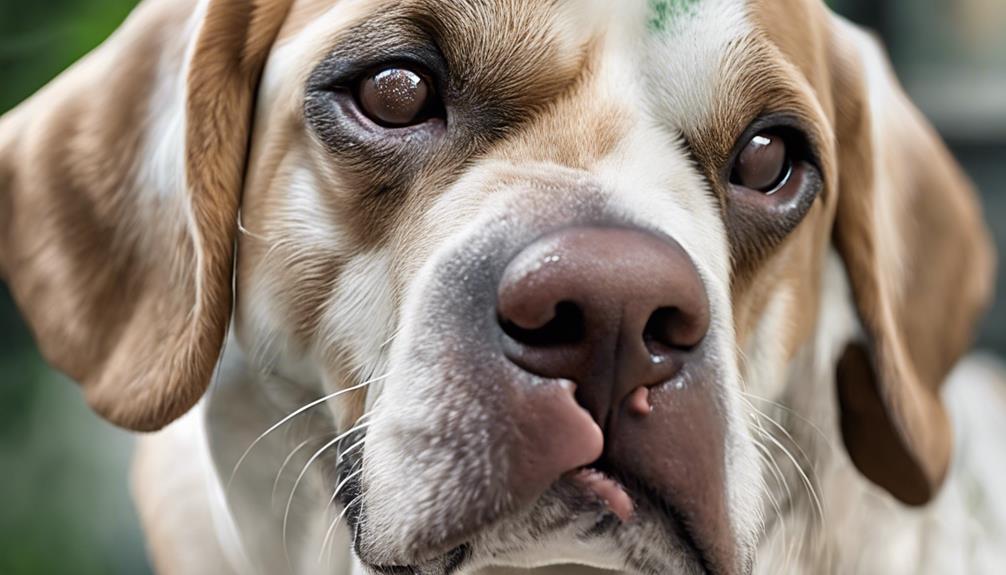
After ingesting Dieffenbachia, dogs may exhibit symptoms of toxicity such as intense burning and irritation in the mouth, tongue, and lips, along with excessive drooling and difficulty swallowing. These signs can be distressing for your furry friend, causing discomfort and potential health risks.
If your dog starts lip-smacking, avoiding food and water, or pawing at their mouth after encountering Dieffenbachia, it's essential to act promptly. In more severe cases, Dieffenbachia toxicity in dogs can progress to respiratory swelling, vomiting, and even allergic reactions.
Immediate veterinary attention is highly recommended if you suspect your dog has been poisoned by Dieffenbachia to prevent further complications. Your veterinarian may provide treatment such as pain medication and gastroprotectants to alleviate the symptoms and aid in your dog's recovery.
Diagnosis of Dieffenbachia Poisoning in Dogs

Diagnosing Dieffenbachia poisoning in dogs typically involves identifying common symptoms such as oral irritation, excessive drooling, vomiting, and difficulty swallowing. If your dog has ingested any part of the Dieffenbachia plant and is displaying these signs, it's essential to seek veterinary attention immediately.
Your vet may perform an oral examination to check for any plant residues in your dog's mouth or throat. Blood tests could also be conducted to detect any abnormalities associated with Dieffenbachia Poisoning, such as insoluble calcium oxalate crystals.
In some cases, imaging tests like X-rays or ultrasounds may be utilized to evaluate the extent of damage caused by the plant ingestion. Providing your vet with a sample of the plant your dog consumed can aid in an accurate diagnosis.
Treatment Options for Dieffenbachia Toxicity
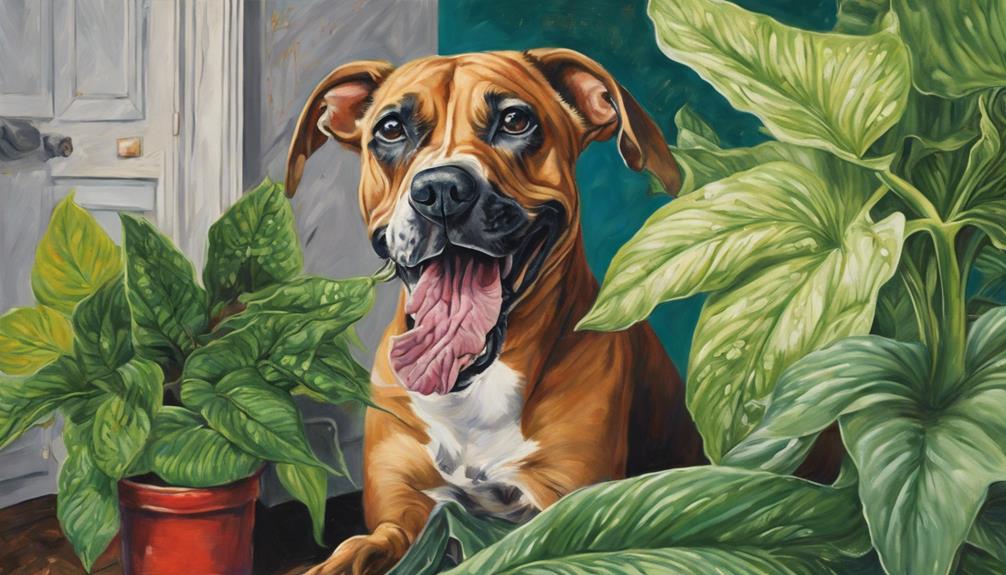
Upon identifying Dieffenbachia poisoning in dogs, the immediate focus shifts to implementing effective treatment options to address the toxicity. Here are some vital steps to take into account:
- Flush the Mouth: Flushing the mouth to remove any remaining pieces of the Dieffenbachia plant is essential to prevent further absorption of calcium oxalate crystals.
- Pain Management: Administering painkillers and protecting the gastrointestinal system can help alleviate discomfort and aid in the recovery process.
- Eye Examination: If the dog's eyes have been exposed to the plant, immediate treatment with saline solution is necessary to prevent additional damage.
- Skin Irritation: Managing skin irritation from contact with the Giant Dumb Cane plant involves washing the affected area with warm, soapy water and using prescription cream if needed.
- Seek Veterinary Care: Immediate veterinary care is crucial for proper diagnosis and treatment of Dieffenbachia toxicity in dogs. Veterinarians can provide specialized care and monitor the dog's progress closely.
Preventing Dieffenbachia Exposure in Dogs

To prevent Dieffenbachia exposure in dogs, it's important to place these plants out of their reach to avoid ingestion. This plant contains insoluble oxalate crystals that can be toxic to dogs and cats if ingested.
Training dogs to avoid chewing on houseplants, including Dieffenbachia, is vital for their safety. Additionally, consider using deterrent sprays or barriers to further safeguard your pets from accessing Dieffenbachia.
When taking your dog for walks, be vigilant and prevent them from ingesting any parts of the plant they may encounter outdoors. Educating family members and visitors about the toxicity of Dieffenbachia is essential to guarantee overall pet safety.
Frequently Asked Questions
What Happens if a Dog Eats a Dieffenbachia?
If a dog eats Dieffenbachia, it can lead to severe oral irritation due to toxic calcium oxalate crystals. Symptoms include excessive drooling, vomiting, and trouble swallowing. Chewing on Dieffenbachia releases these harmful crystals, causing painful mouth ulcers in dogs.
Immediate vet care is essential to prevent complications. Treatment may involve pain and gastroprotectant meds. Keep your pooch away from this plant to avoid these risks.
What Is the Most Poisonous Plant for Dogs?
The most poisonous plant for dogs is the Dieffenbachia. Ingesting this plant can lead to severe symptoms like oral irritation and difficulty swallowing. If a dog consumes Dieffenbachia, prompt veterinary care is essential to prevent potential fatalities.
Treatment may involve flushing the mouth, pain management, and safeguarding the gastrointestinal system. Proper diagnosis through blood tests and imaging is vital in cases of Dieffenbachia poisoning in dogs.
Are Pothos Toxic to Dogs?
Pothos plants are toxic to dogs, causing mouth and tongue irritation if ingested. Symptoms of Pothos toxicity include vomiting and increased salivation.
It's important to keep Pothos away from pets to prevent poisoning incidents.
Are Ivy Plants Poisonous to Dogs?
Ivy plants can be toxic to dogs, causing rash, breathing issues, coma, or paralysis. Despite their innocent appearance, they pose serious health risks.
It's crucial to keep them out of reach to protect our furry friends. Awareness and prevention are key to safeguarding dogs against these toxic effects.
Conclusion
To sum up, it's vital to keep dieffenbachia plants out of reach of your furry friends to prevent potential toxicity. Remember, even though dieffenbachia may look appealing, it can be harmful to dogs if ingested.
By being mindful of the symptoms and taking precautions, you can guarantee the safety and well-being of your beloved pets. So, why take the risk when you can easily avoid it by being proactive and cautious?
Dana is our Lead Content Writer, bringing a wealth of knowledge and expertise to our team. With a background deeply rooted in animal studies and a profound love for all creatures, Dana is dedicated to crafting engaging and informative content that resonates with our audience. With Dana at the helm, you can trust that our content is accurate and engaging, catering to the diverse interests of animal enthusiasts everywhere.
-

 Vetted2 months ago
Vetted2 months ago15 Best Cat Foods for Managing Hyperthyroidism – Vet Approved and Feline Friendly
-
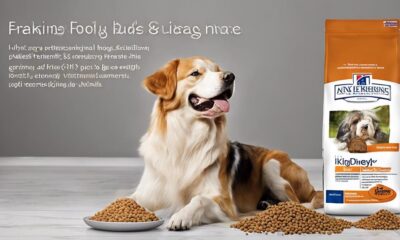
 Vetted2 months ago
Vetted2 months ago15 Best Dog Foods for Kidney Disease – Expert Recommendations for Your Pet's Health
-

 Vetted2 months ago
Vetted2 months ago15 Best Wet Cat Foods for Older Cats to Keep Them Healthy and Happy
-

 Vetted2 months ago
Vetted2 months ago15 Best Fresh Dog Food Delivery Services for Your Pup's Health and Happiness
-

 Vetted2 months ago
Vetted2 months ago14 Best Homemade Dog Food Recipes Your Pup Will Love – Vet Approved & Nutritious
-

 Animal Facts2 months ago
Animal Facts2 months agoSpring Animals: A Guide to Seasonal Wildlife
-

 Cats1 month ago
Cats1 month agoCat Weight Chart by Age: Kitten to Senior in Lbs
-

 Cats2 weeks ago
Cats2 weeks agoTop 5 Cat Breeders in Arkansas: A Guide





















